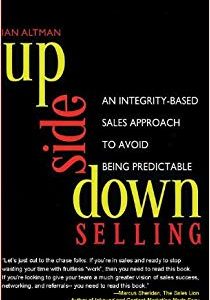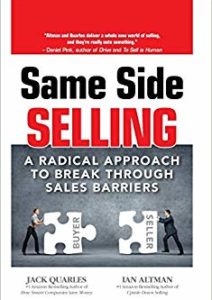I recently met a CEO who wanted to shift his team — from order-takers to sales driven. His rationale?
I think we’re focusing on price, on reacting. I’d like our people to be directly in front of buyers and referral sources — to focus on business value.
Here’s the thing: Sometimes we can get tangled up in definitions. If you understand the different kinds of selling personas, you can pretty easily describe your selling ecosystem. I divide sellers into three broad categories: Order Takers, Salespeople, and Experts. Feel free to test and discuss my assertions on social media.
Sales Persona Categories:
Order Takers
You’re an order taker when a customer contacts you to purchase, and you simply respond. “I want a blue widget.” You reply with the price, and delivery time. While order takers might ask clarifying questions (such as quantities or add-on “up-sell” products), they are probably not invested in making sure that the buyer gets guidance as they purchase. For example, an order taker is unlikely to question “why” the customer wants a certain color, or how they might use the product they are purchasing.
The bad news for order takers is that, like the buggy whip, they’re becoming obsolete. Technology handles most “remote” order taking with good results. Want a set of flatware or an outdoor grill? My wife and I just “Amazon it.” From our smartphones, we can find, evaluate, and place an order in moments — confident that it will arrive quickly.
If you are a confident buyer, one who 100% knows exactly what you want, an order taker is fast and efficient. But, for commodities (which order takers typically sell), you have to compete on price, delivery, and ease of ordering. If you don’t excel in all three areas, avoid this strategy. You are not likely to make order-taking better than Amazon.
Order takes focus on placing the order and moving on to the next one.
Salespeople
Traditionally, salespeople have been stereotyped as fast talkers who can sell ice to residents of the Arctic. They can take you to the top of the mountain and help you see the lush green valley below. Most of us think of this stereotypical salesperson as someone who sees that their job is to convince customers that they need whatever they are selling–whether the customer needs it or not.
The most effective salespeople know how to uncover true need. They might create urgency and map a path to their product or solution, but many are most proud when they are helpful–finding buyers a better, less expensive alternative.
Over time, we’ve become skeptical of the traditional salesperson. Most customers have been lied to enough that they’re skittish about the value of what a “salesperson” is selling — infomercials, phone pitches, and junk mail have contributed to this attitude.
Traditional salespeople focus on getting the customer to make the purchase.
Experts
Nowadays, it’s the Subject Matter Expert who has the reputation for integrity.
In fact, some “salespeople” might cringe when the expert tells the customer that they might be better off with a different solution than their company is selling. Subject matter experts are eager to work with prospects to uncover their challenges and pain points in order to devise a solution that addresses their needs.
Subject matter experts will not up-sell solely to increase the size of an order. However, they will happily suggest things that will enhance the results for the customer. The fashion expert won’t sell you ugly shoes to go with an outfit. But, they will suggest an accessory that will make the outfit memorable for your big event. If you’ve ever shopped at a Nordstrom store, you’ve likely run into an employee who guided you through your shopping experience like a friend would.
Experts are highly informed in their specialized area and are likely to know more about the subject area than the customer. They know how results are achieved, how to avoid risk, and even how to prepare for future needs. They understand the product or service that will augment value (1+1=3). Have you got a critical decision to make? Experts are the people you want in the room in that circumstance.
Experts focus on helping customers achieve results.
Conclusion
Where does your team fit into these categories? Which sales persona works best for your business? To determine the answer, ask a simple question: “If you were the customer, which one would you want working with you?” Let’s face it, customers want to interact with experts, not people “selling stuff.”
If you don’t fit the description, then you’ve got some work to do. Think back to situations where you’ve noted value from a vendor — what made your experience remarkable?












